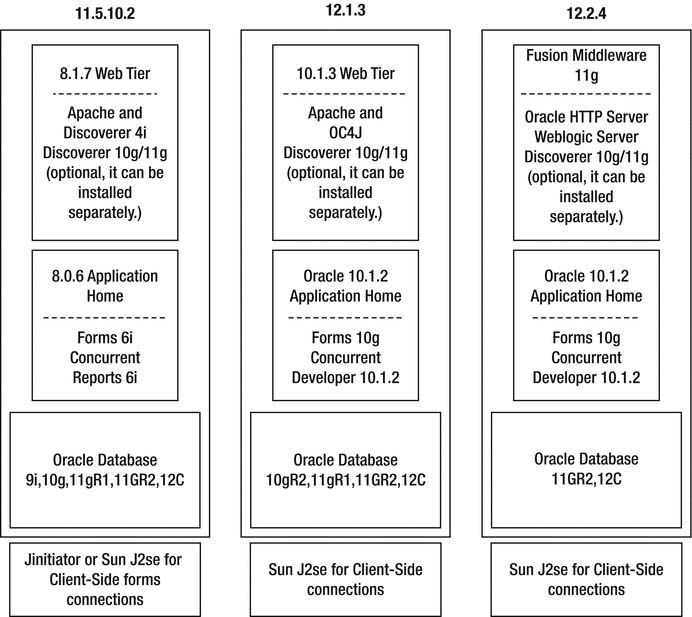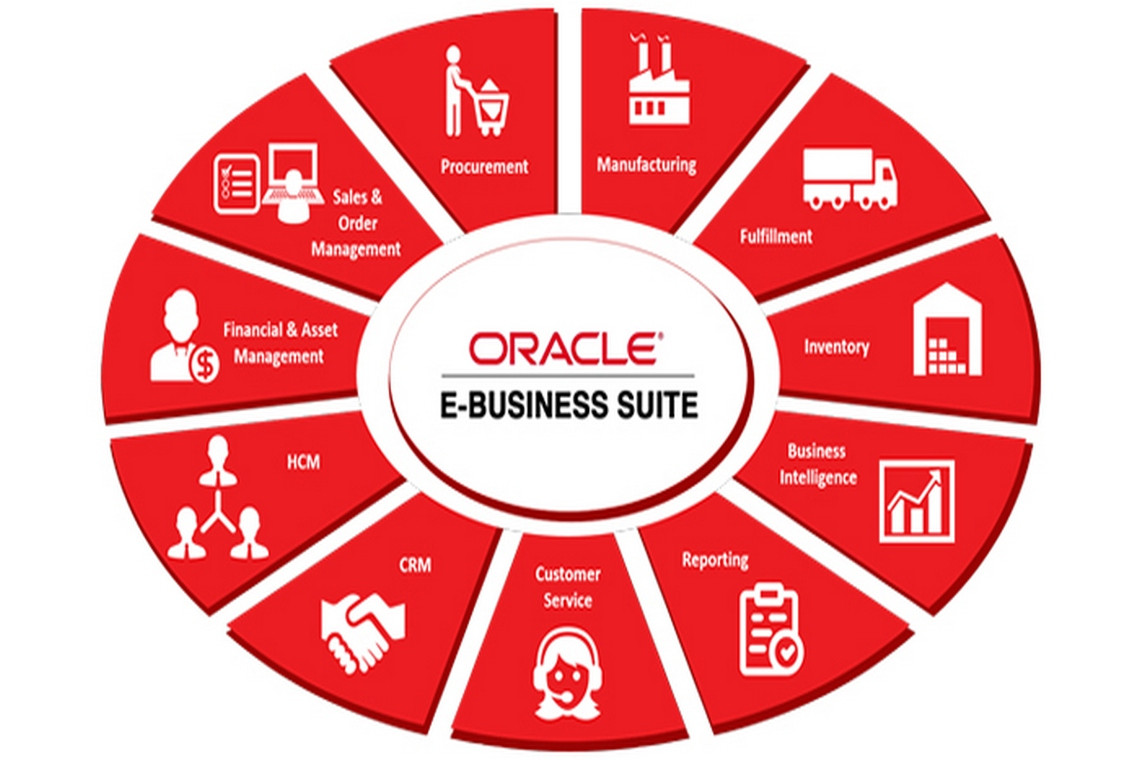Technology Stack Changes in EBS 11i/12.1/12.2
Since the first release of EBS, while the product capabilities have improved, so have the technologies used in EBS. In this section, we will explain the technology stack changes in the major EBS releases.
We will cover the technological architectures of EBS 11i (11.5.10.2), EBS 12 (12.1.3), and EBS 12.2(12.2.4/12.2.5) and explain the differences between them. Although mostly the same Oracle technologies are used in almost all of these releases, the versions of the technological components differ according to EBS release, as shown in Figure 11.

Figure 11. Technological differences between the major EBS releases
The database versions displayed in Figure 11 are the supported/certified database versions classified according to the EBS releases. In this manner, while EBS 11.5.10.2 is certified with 9i and 10g databases, EBS 12.1.3 is not. However, Figure 11 does not give any information regarding to the certifications for the exact four-digit database versions like 9.2.0.8 or 10.2.0.5. That is, EBS 12.1.3 is certified with 10g R2, but it is certified only with the specific 10g R2 releases such as 10.2.0.4 and 10.2.0.5. Also, EBS 12.1.3 and 12.2 are up-to-date EBS releases, so these certifications may be updated soon. That’s why we don’t give details about certified database versions here; we recommend you check the Oracle Support Certifications tab for the exact supported database versions for your EBS instances.
EBS 11.5.10.2 is one of the major releases that is still in use in production environments. EBS 11.5.10.2 is a maintenance pack sits on top of 11.5.10, and it is the latest version of EBS 11i. EBS 11.5.10.2 supports 11g R2 and 12c Oracle Database for the database tier. It utilizes 8.1.7 Web HTTP, which contains the Apache and Discoverer 4i products.
On the application server side, 11.5.0.2 uses the version 8.0.6 application server to support the Forms 6i, Concurrent, and Reports 6i services. Clients connecting to EBS 11.5.10.2 can use Jinitiator or Native Java (Sun J2SE) for the client-side Java activities (for displaying the forms screens). At the time of writing this blog, EBS 11.5.10.2 with its extended support patches was still supported by Oracle, but it was supported with an Extended Support policy, which is a restricted support policy, and it was planning to be supported with a Sustaining Support Policy, which is an even more restricted support at the end of the year 2015.
EBS 12.1.3 is a release update pack on top of 12.1, which is considered to be the most stable release among EBS Release 12 releases (12.0, 12.1). EBS 12.1.3 can be considered a completely new EBS for the environments that still use 11.5.10.2. EBS 12.1.3 utilizes a 10.1.3 Oracle Home for delivering Apache, OC4J Container, and Discoverer 10g. From the application technology point of view, 12.1.3 uses a 10.1.2 Oracle Home to support the Forms 10g, Concurrent, and Developer 10.1.2 services. Clients connecting to EBS 12.1.3 must use Native Java (Sun J2SE) for the client-side Java activities (for displaying the forms screens). EBS 12.1.3 comes with an 11.1.0.7 Oracle Database but supports 10gR2, 11GR2, and 12c Oracle Databases as well. EBS 12.1.3 is still in the Premier Support, which can be considered as a full support policy. EBS 12.1.3 will be in Premier Support until the end of year 2016.
EBS 12.2, which is the subject of this blog, is the latest release of E-Business Suite. Although its versioning number starts with 12, it is considered a new release, not just a release update pack. In EBS 12.2 Fusion Middleware is used for providing the HTTP and application services. HTTP Server and WebLogic delivered within the Fusion Middleware deliver the Oracle HTTP Server and support forms 10g and Oacore (services for OAF pages). A 10.1.2 Oracle Home is used to provide Forms 10g, Concurrent, and Developer 10.1.2 services.
EBS 12.2 when installed with the latest startCD is delivered with a 12.1.0.2 Oracle Enterprise Edition database by default. Also, the earlier versioned EBS databases (11.2.0.3 and 11.2.0.4), which are delivered with EBS 12.2 installations packaged with earlier startCDs, can be upgraded to 12C.
Clients connecting to EBS 12.2 must use Native Java (Sun J2SE) for the client-side Java activities (for displaying the forms screens). With the enhancements in underlying technology and software, EBS 12.2 brings outstanding features such as online patching. EBS 12.2 uses a new file system architecture called dual file system and edition-based redefinition features of Oracle Database to support the new online patching feature. The installation in this new release is RAC aware, so apps DBAs can install the EBS database tier into the ASM file system too. A new and enhanced user interface is among these innovations, as well.
My purpose with my blog is to illustrate all the skills required for implementing, configuring, and maintaining a robust Oracle E-Business Suite 12.2 environment.
To give the implementation information properly, as a matter of fact, in the next my blog we will start explaining the installation of EBS 12.2, followed by the upgrade techniques, and then we will continue with subjects such as the dual filesystem, the new patching concept, the new patching tool (adop), and FMW, which are introduced in EBS 12.2 and can considered as enhancements. Subsequently, we will explain the general EBS subjects such as Sysadmin fundamentals, AutoConfig, and performance tuning by focusing on these subjects in the context of EBS 12.2. Lastly, we will take a look at the implementation processes for implementing EBS 12.2 on Oracle-engineered systems because utilizing engineered systems such as the EBS platforms is the new trend.


